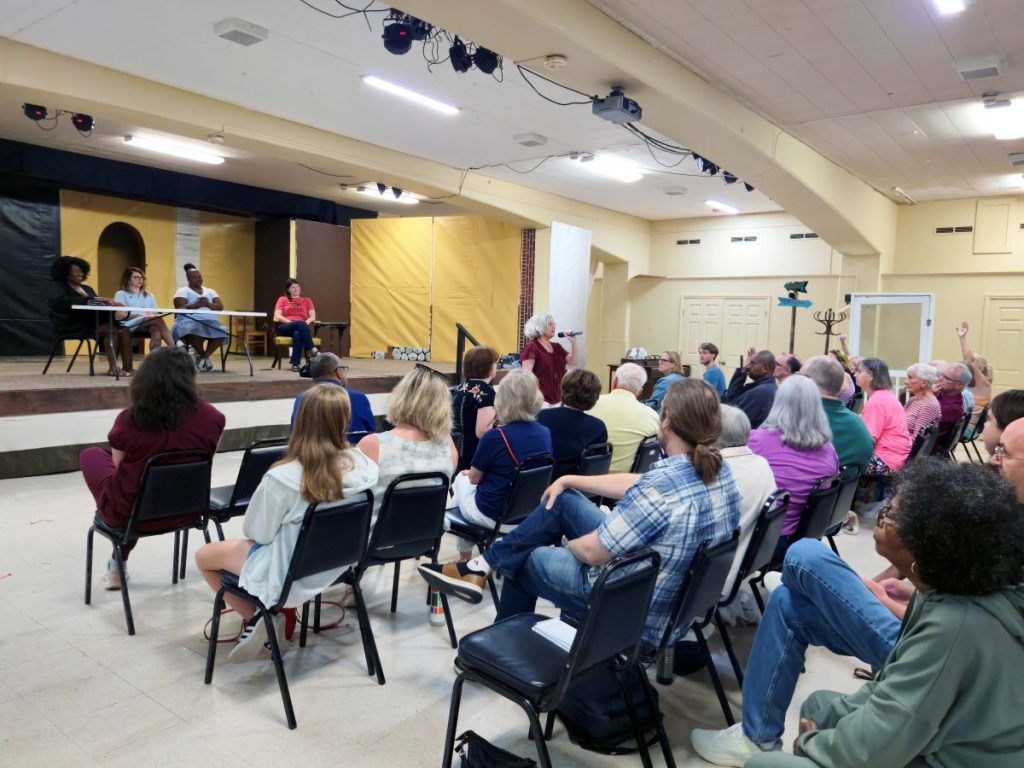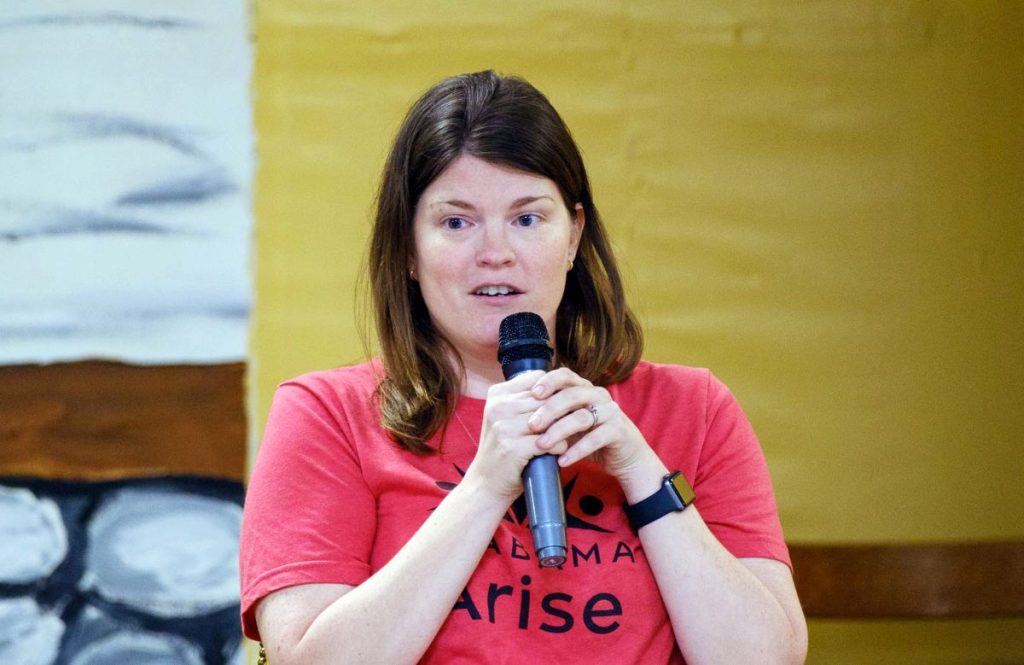Impact of Federal Cuts
Birmingham Nonprofits Urge Opposition to Federal Cuts in Food, Health Care Assistance

If a federal budget bill in Congress becomes law, food assistance for nearly 800,000 Alabamians could be cut or significantly reduced and tens of thousands of people in the state could lose their health insurance or see steep premium hikes, speakers told a crowd of about 75 people during a town hall meeting Saturday.
Alabama Arise, a nonprofit that seeks to improve the lives of people facing poverty, and Birmingham Indivisible, a local chapter of a nationwide group that focuses on progressive activism, organized the meeting, which was held at East Lake United Methodist Church.
“What I really want you to understand is that the entire purpose of this bill is to take from the poor and give to the rich,” said the event’s moderator, Jenn Gray with Birmingham Indivisible. “The good news is that this isn’t law yet. This bill has to be passed by the Senate, and that is where we have to stop it.”
The meeting included two panel discussions on how the One Big Beautiful Bill Act, a name President Donald Trump coined, would affect the Supplemental Nutrition Assistance Program in Alabama and Medicaid coverage as well as Affordable Care Act premiums. The U.S. House of Representatives approved the bill last week, and the Senate is currently considering it.
Audience members also asked questions, and speakers gave them advice on ways to oppose the bill.
SNAP Funding Would Shift to States
The bill would require states to pay for a portion of SNAP benefits, which have been 100% federally funded for decades, said LaTrell Clifford Wood, who moderated the SNAP panel discussion and is hunger policy advocate for Alabama Arise.
This cost shift could leave Alabama on the hook for nearly $300 million a year in direct benefits and additional administrative costs, according to Alabama Arise.
“That would stress our general fund and could potentially lead to the end of Alabama participating in the SNAP program,” Wood said.
Such a loss would cause retailers to leave the state and would raise grocery prices for everyone, she said.
“SNAP vitalizes our economy,” she said. “For every SNAP dollar spent, there’s about $1 to $2 of economic impact that happens.”
The bill also would increase work requirements for people with children as young as 7. Single parents of children ages 7 to 17 would have to work at least 80 hours a month to qualify for SNAP benefits.
“When we have issues already as a state with child care, there are massive implications to saying that you have to go back to work with a 7-year-old,” Wood said.
Panelists Scott Douglas, executive director of Greater Birmingham Ministries, and Suzanne Wright, executive director of Magic City Harvest, told the audience their organizations’ food-assistance resources would be strained if Birmingham-area residents were to see their SNAP benefits eliminated or significantly reduced.
“I’m hoping to write a grant at the end of the year to purchase another refrigerated truck, just to keep up with the demand right now, much less what is going to happen in the future,” Wright said. “It’s going to take a lot of manpower. It’s going to take a lot of time, and we are just looking into ways to respond in a logical, quick way so that children, families will have what they need. Nobody can function at work or at school without nutrition.”
Douglas said Greater Birmingham Ministries will try its best to increase its food-assistance capacity.
He said interviews GBM conducts with clients when they collect food show access to nutrition affects everything in a person’s life. “We see hunger as part of a community-wide, statewide, nationwide fight,” he said, so people can thrive and live with dignity.

Medicaid and ACA Changes
The bill also would cut Medicaid by $716 billion over the next decade, the largest cut in the program’s history, said Debbie Smith, Cover Alabama campaign director for Alabama Arise and the health-care panel discussion moderator.
In addition, the bill would eliminate extra financial help thousands of Alabamians receive to reduce health insurance premiums for Affordable Care Act plans through HealthCare.gov. Those enhanced subsidies are what made the plans affordable, Smith said.
In Alabama, where the health care industry is a top employer, the loss of premium subsidies alone would cause 10,000 people to lose their jobs in one year and would deal a $1 billion blow to the state’s gross domestic product, she said.
Approximately 170,000 Alabamians could lose health care coverage if the bill becomes law, as written, and that means people dying, Smith said.
“This is not just numbers,” Smith said.
Angelica McCain, an Irondale resident who was part of the health care panel, told the audience this is the first year she has had health insurance in her adult life, and she was able to afford it only because of the subsidies the House bill would cut.
McCain, who is a single parent and has worked in the service industry throughout her career, said her children and her entire family have benefited from the Medicaid coverage her kids receive. Doctors removed a tumor from McCain’s daughter’s stomach.
“It saved her life,” McCain said, adding that because of Medicaid, the family is not in thousands of dollars of medical debt.
McCain said she will be without health care coverage again if the One Big Beautiful Bill Act becomes law, and Gina Mallisham, development director of AIDS Alabama and another member of the health care panel, said her organization’s staff expect that to be the case for many of the people they serve.
AIDS Alabama is primarily known for its HIV services but provides a lot more, including ACA navigators who help people across the state sign up for health insurance, Mallisham said. She said the end of enhanced subsidies would mean many premium payments would increase by more than 75%.
“So for our navigators, those challenges mean that they have to deliver that devastating news to our residents and then explain why coverage that was affordable before is not affordable now,” she said.
Crystina Hughes, community outreach director for WAWC Healthcare, a clinic in Tuscaloosa, and a member of the health care panel, said the House bill would eliminate Medicaid reimbursements the clinic receives for providing gender-affirming care.
The clinic’s patients, most of whom have Medicaid insurance, are very concerned about whether they will continue to receive care, Hughes said.
Organizers Encourage Action
When panelists were asked what they would say to Alabama’s U.S. senators, Katie Britt and Tommy Tuberville, Hughes said she would invite them to the WAWC clinic to meet with patients.
“I think the main issue is that they’re sitting in their office and they’re proposing things that they don’t know will help or harm,” she said.
McCain said the main questions she likes to ask any representative are: “How does the decision that you’re making help anybody? How does it protect anybody?”
Smith encouraged audience members to contact their senators, attend similar events, get involved in advocacy efforts and share personal stories. QR codes were posted around the room and postcards were available at tables to assist audience members in contacting their representatives.
Mallisham noted that all phone calls and correspondence with Congress members have to be recorded and told the audience it does matter when they reach out.
“Your pressure is working,” Smith said.


